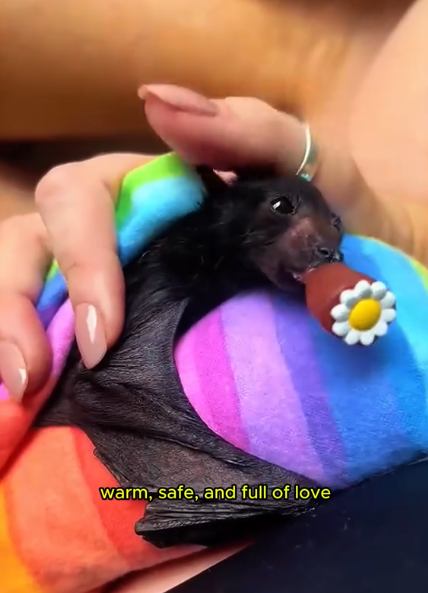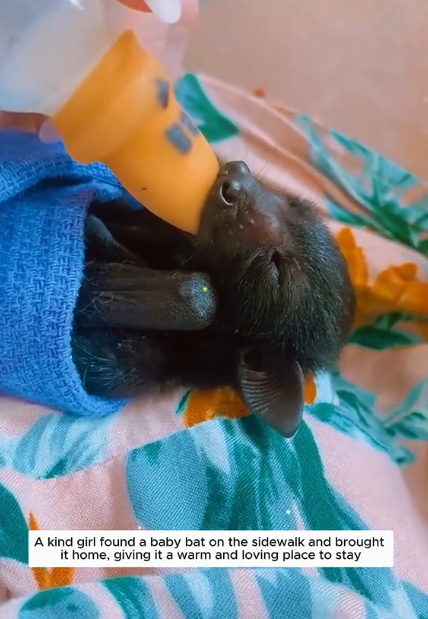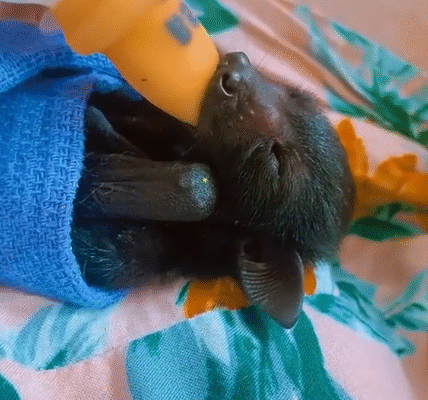
One warm summer evening, as the sun dipped below the horizon and the sky blushed with shades of lavender and gold, 15-year-old Lily was taking her usual stroll through the neighborhood park. The air was thick with the chirping of crickets and the rustle of leaves. Birds were settling into their nests, and fireflies blinked like tiny stars in the grass. Lily always enjoyed these walks. Nature comforted her in a way nothing else could.
As she passed under a towering sycamore tree, a soft, high-pitched squeak caught her attention. At first, she thought it was a bird, but the sound didn’t quite match. She paused, scanning the area. That’s when she saw it—something tiny and dark moving in the grass. She knelt down and, to her amazement, found a baby bat. It was no larger than her thumb, with paper-thin wings and velvety fur. Its eyes were barely open, and it looked weak, shivering slightly.
Lily’s heart broke at the sight. She knew that baby bats, also called pups, needed their mothers to survive the early weeks of life. This one was alone, and clearly too young to fend for itself. Carefully, she cupped the tiny creature in her hands, wrapping it gently in a tissue she found in her bag. The baby bat clung to her finger, seeking warmth and comfort.
Determined to help, Lily rushed home. Her parents, used to her love for animals, didn’t flinch when she showed them the little bat. Instead, they helped her search online for local wildlife rescue information. Unfortunately, it was already evening, and most wildlife centers were closed. So, Lily decided she would take care of the bat overnight and bring it to a wildlife rehabilitator first thing in the morning.
She made a temporary nest using a shoebox, soft cloth, and a small water bottle wrapped in a towel to keep the bat warm. She learned that baby bats, like this one, are often dehydrated and need electrolyte fluids before they can even be fed. Carefully, Lily dipped a clean cotton swab in a mixture of sugar and water and touched it to the bat’s mouth. To her relief, it began to lick it slowly.
That night, Lily barely slept. She checked on the little creature every hour, ensuring it stayed warm and comfortable. She named him “Echo,” after the bat’s incredible echolocation ability. Echo was fragile, but he had a will to survive that mirrored Lily’s determination to save him.

The next morning, with the sun rising over the rooftops, Lily and her mother drove to the nearest wildlife rehabilitation center. The rehabilitator, a kind woman named Joanne, examined Echo carefully.
“He’s about five days old,” Joanne said. “It’s lucky you found him when you did. Another few hours alone, and he probably wouldn’t have made it.”
Lily’s eyes welled with tears, a mix of relief and sadness. She asked if she could stay involved in Echo’s care, and Joanne, seeing her dedication, agreed to let her volunteer at the center on weekends.
Over the next few weeks, Lily visited Echo regularly. Under Joanne’s expert care, and with Lily’s continued presence, Echo grew stronger. He learned to flap his wings, feed on bat milk formula, and eventually catch small insects. His once fragile body became agile, his wings firm and graceful.
As Echo developed, Lily learned more about bats and how misunderstood they often were. Most people feared them or thought they were dirty. In reality, bats were essential for ecosystems—pollinating flowers, dispersing seeds, and eating harmful insects like mosquitoes. Lily began to share Echo’s story with her schoolmates, giving presentations about the importance of bats in the environment. Her passion ignited curiosity in others, and soon her class started a small “Wildlife Awareness Club.”
Through it all, Lily remained closely connected with Echo. Though bats are wild animals and cannot be kept as pets, Echo recognized Lily’s scent and voice. When she entered the rehab room, he would chirp softly and flutter toward her. Their bond was undeniable, even if it would eventually have to end.
The day came when Echo was ready for release. He had passed all his flight tests, could hunt on his own, and showed natural bat behavior. Joanne explained that bats must be released at dusk, in an area where there’s plenty of food and natural shelter.
Lily and her parents joined Joanne at a nearby forest reserve. The air buzzed with insects, and the trees swayed gently under the early night breeze. Joanne held the carrier up, opened the door, and Echo climbed out slowly. He looked around, and with one final look toward Lily, he spread his wings and flew into the twilight.
Lily stood silently, watching him disappear into the forest canopy. A tear slid down her cheek, but it was a tear of joy. She had saved a life—something most people never get the chance to do. Echo was back where he belonged, wild and free, and she was proud to have been part of his journey.
Her experience with Echo changed her life. Lily continued volunteering at the wildlife center and even considered becoming a wildlife veterinarian. Echo had opened her heart wider than ever before and shown her the power of compassion, education, and action.
As months passed, Lily still visited the spot where Echo had been released. Sometimes, as the sun set and the first bats began to emerge, she imagined one of them might be Echo—free, healthy, and thriving thanks to one kind girl who stopped to help.
And in her heart, she knew that sometimes, all it takes is one small act of kindness to change a life—whether it belongs to a person or a tiny, orphaned baby bat.



